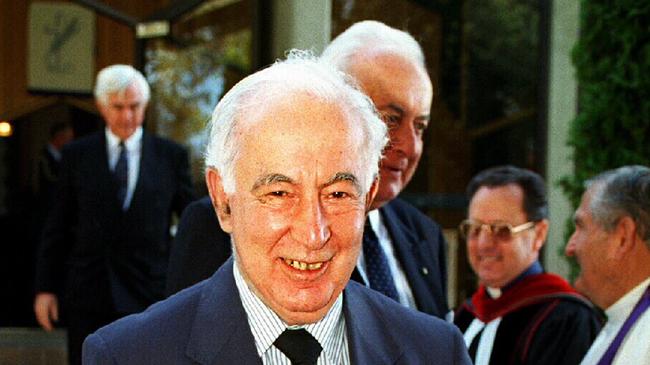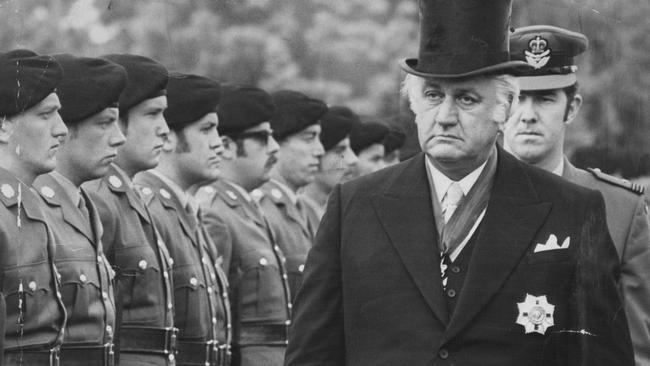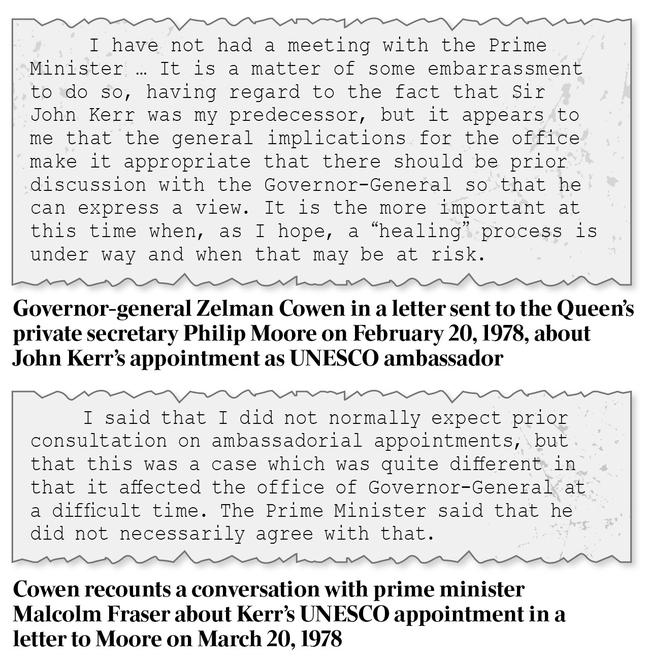Malcolm Fraser ‘frustrated’ post-John Kerr healing, said Zelman Cowen
Zelman Cowen pledged to the Queen that he would undertake a ‘healing process’ in the years after John Kerr’s dismissal of Gough Whitlam, but was frustrated by Malcolm Fraser.

Zelman Cowen pledged to the Queen that he would undertake a “healing process” in the years after John Kerr’s dismissal of Gough Whitlam, recognising the divisions that had been unleashed, but was frustrated by Malcolm Fraser.
The governor-general’s vice-regal letters to the Queen, open for access by the National Archives of Australia, reveal he was deeply concerned about Kerr’s appointment as ambassador to the UN Educational, Scientific and Cultural Organisation and summoned Fraser to convey his disappointment that he was not consulted.
“The prime minister had not spoken to me in advance of the appointment,” Cowen wrote to Philip Moore, the Queen’s private secretary, in March 1978.
“I did not normally expect prior consultation on ambassadorial appointments but this was a case which was quite different in that it affected the office of governor-general at a difficult time.”
Given the public outcry, Kerr resigned as ambassador before taking up his duties, which confirmed to Cowen it was a misjudgment by Fraser.
Buckingham Palace also thought it an unwise decision.
In February 1978, Cowen reported to Moore that Kerr’s appointment, made via the Executive Council, had come to him with little notice late in the day and without an opportunity to provide advice.
He said his “healing process” was put at risk by Kerr’s ambassadorial appointment.
The Queen’s private secretary told Cowen the following month that the Kerr appointment “came as a complete surprise” and was “controversial in the light of the events of 1975”. Moore told Cowen he should have been consulted and it would have been more “appropriate” for Kerr to be given a different post, such as chairing a royal commission.
In December 1977, Cowen invited Whitlam to Government House as “a happy and healing act” at a time when Labor anger over the dismissal had not subsided. Some Labor MPs boycotted official events that involved Kerr.
This olive branch to Whitlam had the support of Buckingham Palace. “It is very satisfactory that you had a cordial meeting with Mr Whitlam,” Moore wrote in March 1978. “Although he is no longer leader of the Labour (sic) Party, it would have been a pity if his estrangement with Government House continued.”

Access to Cowen’s vice-regal letters between 1977 and 1982 was requested by The Australian before and after the High Court ruling in May 2020 that they were official, not personal, records.
They reveal that Cowen, like his predecessors Kerr and Paul Hasluck, wrote extensively and candidly to Buckingham Palace about political matters, criticised prime ministers and disagreed with certain government decisions. Cowen’s letters total more than 500 pages.
Academics who say Kerr’s letters breached protocol and convention, and were remarkably different to his predecessors and successors because they canvassed political matters, are mistaken. Indeed, Moore told Cowen in July 1982 his political assessments were “invaluable to the Queen”.
Strong disagreements between Cowen and Fraser were given full expression in the letters. When a TV ad on behalf of the Liberal Party depicted Cowen in December 1980, he told Fraser he was “deeply concerned” and “very unhappy” about it.
In February 1978, following the bombing of the Sydney Hilton Hotel, Fraser asked Cowen to make an order, with Executive Council advice, calling out the defence force. Cowen was uneasy and told Buckingham Palace he subsequently asked Fraser for “fuller advice on the legal basis for the making of the order”. He later wrote to Moore noting the advice provided by the attorney-general and solicitor-general was not entirely satisfactory.
Cowen was operating in Kerr’s shadow. The dismissal of the Whitlam government, accordingly, features in the letters.

Moore was relieved that Kerr’s memoirs did not disclose correspondence with his predecessor, Martin Charteris, when published in late 1978.
He added it was “unfortunate” Whitlam used the book to call for an Australian republic.
In response to media reporting, Buckingham Palace revealed in December 1978 that the Queen would not have consulted her UK ministers if Whitlam had sought to remove Kerr from office before his dismissal.
“It is worrying that such misconceptions should exist,” Moore wrote to Cowen.
The “touch of healing” Cowen hoped to bring to the vice-regal post was succeeding, he reflected in May 1979, and there was “none of violence and tumult” that followed the dismissal but it was an ongoing project and some “bitterness” still remained in public life.
The National Archives has made excessive redactions to the Cowen and Moore letters that deal with policy matters and relate to the 1975 dismissal. This is despite the letters being official records and almost all at least 40 years old. There were no redactions in the Kerr correspondence released in July 2020.




To join the conversation, please log in. Don't have an account? Register
Join the conversation, you are commenting as Logout